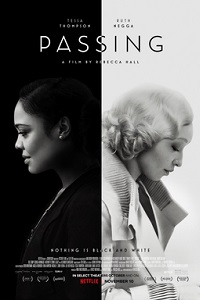♣♣♣♣♣/♣♣♣♣♣
1920s. Seeking refuge from New York’s sweltering summer heat, mother-of-two Irene Redfield (Tessa Thompson) hails a cab and ends up at a hotel restaurant where she runs into a light-skinned African American woman who claims to be her childhood friend. After a few seconds of reflection, she gets to finally remember her. Clare (Ruth Negga) has been spending the last few years of her life married to racist John Bellew (Alexander Skarsgård), who openly despises negroes, unaware that her wife is actually one. In fact, she has been “passing”, a social phenomenon where light-skinned African Americans pass for white or other ethnicities as a form of escape from the unfavorable socioeconomic consequences of having dark skin in America. As the two childhood friends spend more time together, Clare finds herself enjoying the reconnection to her roots. Irene, on the other hand, somehow feels as if her life was being intruded by someone she has already forgotten long ago.
That ending, though. I’ve read in some reviews that the book also ends in such a way, an ambiguous tragedy to end a life. The intrigue here is threefold, each with its own plethora of interpretations and hidden meanings. Did Irene push Clare? Did John push Clare? Or did Clare jump? I have no idea how this level of ambiguity is dealt with in the book, but in this film, the director takes advantage of angles and split-second transitions. In the end, you as the moviegoer, are tasked to interpret the ending on your own.
If Irene indeed pushed Clare, there are many interpretations that could come to mind. Is her jealousy of her friend, which she vocally expresses from time to time, the determining factor for such a brash and murderous decision? If not, did she do it as a favor, some form of quick escape for her friend, knowing that her life already ended right then and there anyway with her husband’s discovery? Even the interpretation of an ambiguous could’ve been subplot is ambiguous in itself.
The other possibility, that of John ending his wife’s life, is probably the least dramatic of the three because it is just straightforward racist and shallow, even though it is not that hard to believe that such people do exist in real life. What more in 1920’s America. Given his reaction, though, it leads you to believe that this interpretation is probably the least likely to have occurred. It does, however, give the character some sort of redefining moment, which would possibly pivotal for his character development offscreen.
And the last option, did Clare jump? Of the three possibilities, this is perhaps the most dramatic and poetic because it can serve as a metaphor for so many things. Nonetheless, it doesn’t make it any less tragic. If she indeed jumped end ended her own life, then it goes to show how her life decisions have come back to haunt her. In trying to reconnect with a life she already escaped from, she finds out the hard way that it is no longer a possibility, and in a rather unfortunate snap decision, she ends it all. After all, she is as good as dead anyway. Figuratively. So, might as well make that a reality in the literal sense.
While much of the discussion about the film has been focused on that specific scene in the ending, let’s not discount the gorgeous black and white treatment they opted for to film this. Not only does the cinematography elevate the film’s visual allure, but it also plays around with the racial theme itself. With that black and white treatment, it makes it even harder to distinguish who is of which ethnicity. In effect, it further reinforces the central theme through the camera’s point of view. Genius, I must say.
For some, especially us who are not that well-versed about racial politics in the United States because they do not figure that much in our daily realities on this side of the planet, the material is educational. Google “Passing” and you will be surprised with the complete bibliography and pages of discourse regarding this social phenomenon. A learning experience, to say the least.









0 creature(s) gave a damn:
Post a Comment